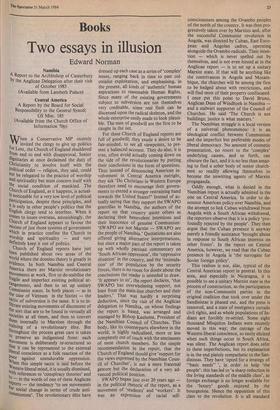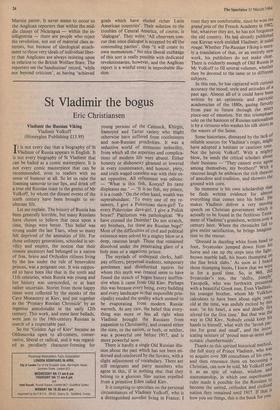Books
Two essays in illusion
Edward Norman
Namibia A Report to the Archbishop of Canterbury by the Anglican Delegation after their visit of October 1983 (Available from Lambeth Palace) Central America A Report by the Board for Social Responsibility to the General Synod; GS Misc. 185 (Available from the Church Office of Information 70p)
when a Conservative MP recently invited the clergy to give up politics for Lent, the Church of England shuddered from end to end with disapproval. Senior dignitaries at once declaimed the duty of Christianity to involve itself with the Political order — religion, they said, could not be relegated to the practice of worship and spirituality but must concern itself with the social condition of mankind. The Church of England, as it happens, is actual- 1Y noticeable for a very low level of political Participation, despite these principles, and it is only in other people's politics that the nglish clergy tend to interfere. When it Conies to issues overseas, astonishingly, the Church of England appears to favour the success of just those systems of government which in practice confine the Church to Worship and spirituality — and very definitely keep it out of politics. Church of England reports have just been published about two areas of the World where the domino theory is greatly in evidence. In both Namibia and Central Arnerica there are Marxist revolutionary Innvements at work, first to de-stabilise the fragile and imperfect existing political ar- r,angements, and then to set up unitary Communist states. In both places — as in the case of Vietnam in the Sixties — the tactic of subversion is the same. It is to in- filtrate existing movements of discontent of the sort that are to be found in virtually all scieieties at all times, and then to convert them internally to Marxism through the training of a revolutionary elite. But throughout the process great care is taken to preserve an indigenised front: each Movement is deliberately re-structured so trhat it can be represented to the external iberal conscience as a folk reaction of the 0or against unendurable oppression. vy hen this simple tactic is laid before the Western liberal mind, it is usually dismissed, with references to 'conspiracy theories' and in the words of one of these Anglican rceP°ns — the tendency `to see movements '01- social change in terms of crude anti- eftmunism' . The revolutionary elite have
dressed up each case as a series of 'complex' issues, ranging back in time to past col- onialist exploitation, and emphasising, in the present, all kinds of 'authentic' human aspirations to reasonable Human Rights. Since many of the existing governments subject to subversion are not themselves very creditable, some real flesh can be discerned upon the radical skeleton, and the whole enterprise easily made to look plausi- ble. The men of goodwill are the first to be caught in the net.
For these Church of England reports are full of goodwill; they exude a desire to be fair-minded, to see all viewpoints, to pre- sent a balanced account. They do also, it is true, often avoid actually coming down on the side of the revolutionaries by putting , their conclusions in the form of questions. Thus instead of denouncing American in- volvement in Central America outright, they ask `Do Christians in Western Europe therefore need to encourage their govern- ments to extend a stronger restraining hand towards the United States?' Instead of ac- tually saying that they support the SWAPO guerrillas in Namibia, the authors of the report on that country quote others as declaring their benevolent intentions and their innocence of genuine Communism: 'SWAPO are not Marxist — SWAPO are the people of Namibia.' Quotations are also offered giving alternative interpretations, but since a major part of the report is taken up with wholly partisan commentary on 'South African oppression', the 'oppressive situation' in the country, and the 'intimida- tion' of the population by the security forces, there is no room for doubt about the conclusions the reader is intended to draw. 'It appears to us', the report declares, 'that SWAPO has overwhelming support, not least from the main-line churches and their leaders.' That was hardly a surprising deduction, since the visit of the Anglican delegation to Namibia, on whose findings the report is based, was arranged and managed by Bishop Kauluma, President of the Namibian Council of Churches. This body, like its counterparts elsewhere in the world, is highly radicalised, more or less completely out of touch with the sentiments of most church members. So the simple recommendation in the report, that the Church of England should give 'support for the views expressed by the Namibian Coun- cil of Churches', is not a mere fraternal gesture but the declaration of a very ad- vanced political position.
SWAPO began just over 20 years ago — in the political rhetoric of the report, as a movement of 'students' and 'workers'. It was an expression of racial self-
consciousness among the Ovambo peoples of the north of the country. It was then pro- gressively taken over by Marxists and, after the successful Communist revolution in Angola, was directed by Cuban, East Euro- pean and Angolan cadres, operating alongside the Ovambo radicals. Their inten- tion — which is never spelled out by themselves, and is not even hinted at in the Anglican report — is to set up a unitary Marxist state. If that will be anything like the contrivances in Angola and Mozam- bique, the churches will be among the first to be hedged about with restrictions, and will find most of their property confiscated. I once put this point to David Bruno, Anglican Dean of Windhoek in Namibia — and a stalwart supporter of the Council of Churches. He said 'The Church is not buildings; justice is what matters.'
The Namibian struggle is a local version of a universal phenomenon: it is an ideological conflict between Communism and the imperfect but preferable modes of .liberal democracy. No amount of cosmetic presentation, no resort to the 'complex' underlying causes, and so forth, can obscure the fact, and it is no less than amaz- ing to find a sober body of senior church- men so readily allowing themselves to become the unwitting agents of Marxist progaganda.
Oddly enough, what is denied in the Namibian report is actually admitted in the one on Central America. In order to de- nounce American policy over Namibia, and the attempt to link Cuban withdrawal from .Angola with a South African withdrawal, the reporters observe that it is a policy 'pro- foundly rejected by the people'. They then argue that the Cuban presence is anyway merely a friendly assistance 'brought about in response to South African interests on other fronts'. In the report on Central America, however, we read that the Cuban presence in Angola is 'the surrogate for Soviet foreign policy'.
This realism is not, alas, typical of the Central American report in general. In this area, and especially in Nicaragua, it is possible to see a unitary Marxist state in the process of construction, as the participation of the non-Communist parties in the original coalition that took over under the Sandinistas is phased out, and the press is censored, and a state of emergency curtails civil rights, and as whole populations of In- dians are forcibly re-settled. Some eight thousand Misquitos Indians were recently moved in this way; the outrage of the Western liberal conscience, so easily elicited when such things occur in South Africa, was silent. The Anglican report does refer to these imperfections, but its explanation is in the end plainly sympathetic to the San- dinistas. They have 'opted for a strategy of "basic needs" ', in order to help 'the people': this has led to 'a sharp reduction in the living standards of the middle class', as foreign exchange is no longer available for the 'luxury' goods enjoyed by the bourgeoisie. Hence the opposition of this class to the revolution. It is all standard Marxist patter. It never seems to occur to the Anglican reporters that within the mid- dle classes of Nicaragua — within the in- telligentsia — there are people who reject the revolution, not out of material class in- terests, but because of ideological attach- ment to those very ideals of individual liber- ty that Anglicans are always insisting upon in relation to the British Welfare State. The reporters see the Sandinistas' record, 'while not beyond criticism', as having 'achieved goals which have eluded richer Latin American countries'. Their solution to the troubles of Central America, of course, is 'dialogue'. They write: 'All observers con- cur that once dialogue is accepted by all the contending parties', then 'it will create its own momentum.' No nice liberal exchange of this sort is really possible with dedicated revolutionaries, however, and the Anglican report is a wistful essay in improbable illu- sion.















































 Previous page
Previous page